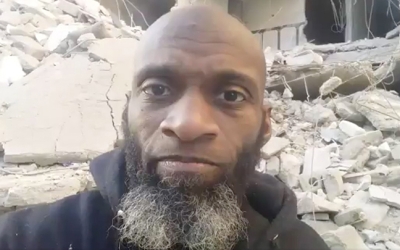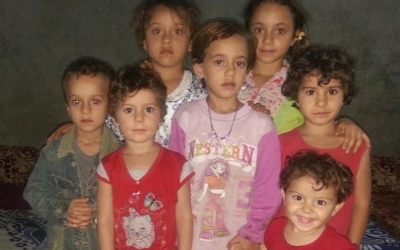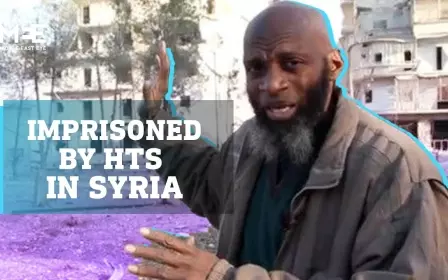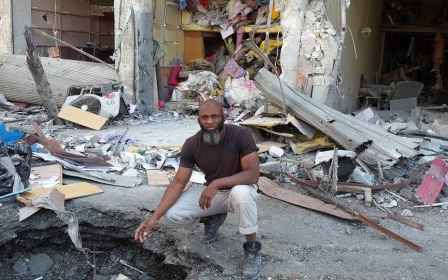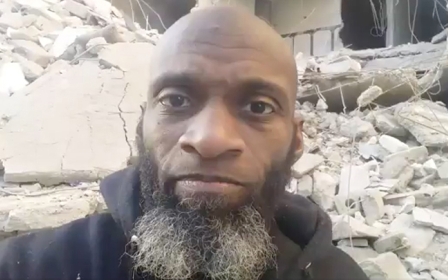US journalist Bilal Abdul Kareem files Supreme Court petition over 'kill list' lawsuit
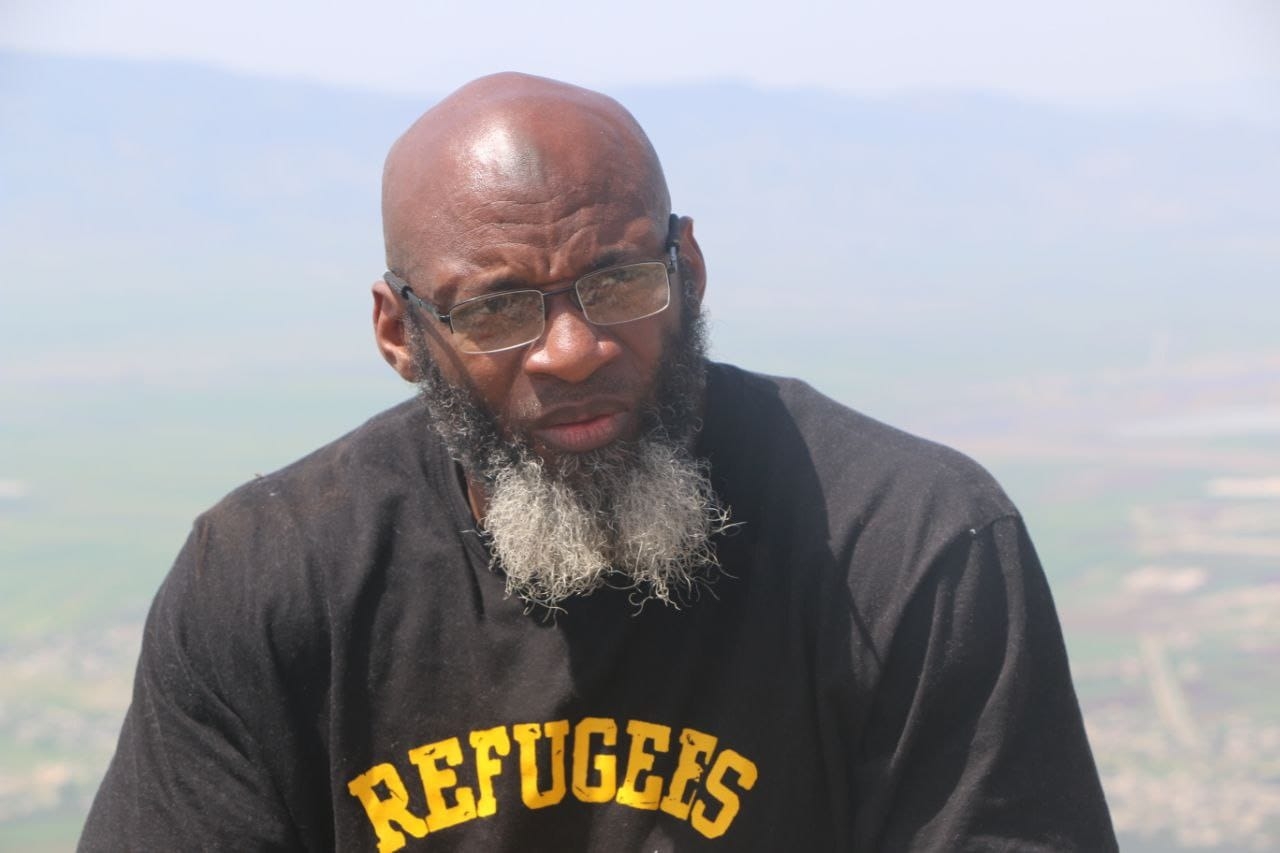
Bilal Abdul Kareem, an American journalist based in opposition-held northwestern Syria, is petitioning the US Supreme Court to review his case accusing the government of placing him on a "kill list", and alleging that he was consequently targeted five times by US strikes in 2016.
The petition is the latest development in a years-long legal battle between the United States government and Abdul Kareem, and calls on the Supreme Court to decide whether a lower court erred in its dismissal of his case.
'What our case is really about is: can the United States kill a US citizen without due process, on the basis that its desire to execute its own citizens is a state secret?'
- Tara Plochocki, legal counsel for Bilal Abdul Kareem
"What our case is really about is: can the United States kill a US citizen without due process, on the basis that its desire to execute its own citizens is a state secret?" Tara Plochocki, legal counsel for Abdul Kareem, told Middle East Eye.
The filing argues that an appellate court had erroneously dismissed the journalist's lawsuit earlier this year by using unrelated facts about the Syrian war.
Abdul Kareem, a contributor for MEE who is best known for his reporting from the final days of the battle in eastern Aleppo in 2016, is a founder of On the Ground News, an outlet that has covered Syria's civil war from within opposition-held territory.
New MEE newsletter: Jerusalem Dispatch
Sign up to get the latest insights and analysis on Israel-Palestine, alongside Turkey Unpacked and other MEE newsletters
In March 2017, he filed a lawsuit in a Washington DC district court against the Central Intelligence Agency, Department of Defense, and several other government agencies.
The complaint alleged that he had been placed on a "kill list" by the US government in a manner that is unconstitutional and violates his right to due process.
The lawsuit suggested that Abdul Kareem may have been targeted as a consequence of a US National Security Agency programme called “Skynet" that determines whether a person posed a threat based on patterns in their mobile phone communications and associated metadata.
It also includes details of five air strikes in 2016 when Abdul Kareem believes he was targeted by the US, including a drone strike where his car was allegedly destroyed by an American Hellfire missile.
Judicial notice
In September 2019, the district court dismissed the case after the US invoked the "state secrets" privilege in order to avoid disclosing information on its kill list, while concluding that it was plausible that he was a target of the government.
However, after appealing the decision, an appellate court dismissed the case in January 2021 on the basis of state secrets and that he could not “explicitly link the United States” to the attacks against him.
The court took judicial notice - declaring a fact presented as evidence to be true without formal evaluation - of two previously uncited reports by the Congressional Research Service and the US State Department on the Syrian war, and concluded that it could not be proved that the US was responsible for the strikes, as “numerous actors were involved in the Syrian conflict”.
'The only difference between the people killed in Afghanistan two weeks ago in a mistaken drone strike and Bilal Abdul Kareem is that I didn't die'
- Bilal Abdul Kareem
Plochocki said that the appellate decision was "completely inappropriate", adding that trial or federal district courts are where fact-finding is done, not the appellate court.
"At this stage in the case, a court is supposed to only look at what's in the complaint, and decide if the claim is plausible or if it's deficient for some other reason," she told MEE.
"When we appealed the state secrets decision, the court of appeals said 'instead of answering the state secrets question, we're just going to go around you, find some stuff in a report online and say, it doesn't seem likely that you have a real claim'.
"And that's really inappropriate to do as a procedural matter."
Abdul Kareem's petition argues that the DC Circuit appellate court “employed a wholly improper use of judicial notice” which had resulted in “an egregious departure from the accepted and usual course of judicial proceedings, one that has life or death implications”.
It questions the court's reliance on reports describing the aerial bombardment of opposition-held eastern Aleppo by Syrian and Russian forces in September 2016, and the use of “bunker-busting bombs and incendiary munitions” and indiscriminate targeting of civilians during that campaign.
It points out that the alleged attacks against Abdul Kareem were targeted strikes that occurred earlier in 2016 in different locations and involving “an entirely different weapon” to those described in the reports.
“Had the 'facts' judicially noticed been subjected to meaningful evaluation, Kareem would have shown that they were neither reliable nor relevant to the claims and that the limited research done by the court on its own initiative did not link Russians or Syrians or anyone else to the specific time, place, or manner of the attacks alleged,” it says.
'Denied my day in court'
The US and its allies have launched numerous air strikes targeting militant groups in northwestern Syria allegedly linked to al-Qaeda or the Islamic State group since intervening in the country in 2014 as part of an anti-IS coalition.
On Monday, US Central Command said it had carried out an air strike targeting a “senior al-Qaeda leader” near Idlib in northwestern Syria. Local reports said the strike had targeted a vehicle carrying commanders with the al-Qaeda-affiliated Hurras al-Din.
But the US has also faced complaints of mistakenly killing civilians, and of failing to properly investigate civilian casualties, in the region.
Asked for comment about his case on Tuesday, Abdul Kareem told MEE: "After several years of legal manoeuvring have passed I'm still denied my day in court to clear my name.
"Someone may be thinking, 'Something must be going on. He must have done something!' I say, 'Yes something is going on. A concerted effort to keep me from challenging whatever 'evidence' they say they have is going on."
Abdul Kareem also cited a US drone strike in Afghanistan last month which killed 10 members of a single family, including seven children.
After initially defending the strike as a successful attack on the Islamic State (IS) group, US Secretary of Defense Lloyd Austin on Friday admitted it had been a "horrible mistake".
Abdul Kareem said: "The only difference between the people killed in Afghanistan two weeks ago in a mistaken drone strike and Bilal Abdul Kareem is that I didn't die."
Asked whether he believed he is still a US target, Abdul Kareem said there had been no apparent attempts on his life since the case was filed.
"I do believe that putting a light on this case really threw them for a loop. They're accustomed to doing the things that they want to do and not having any type of legal opposition. But it didn't happen this time. And I'm glad it didn't happen."
Rights group Reprieve, which is supporting Abdul Kareem's case, said the Supreme Court petition has important consequences for the US lethal drone programme.
Jennifer Gibson, head of Reprieve's extrajudicial executions team, told MEE: "If a US citizen cannot obtain answers or accountability about strikes targeting him, what hope is there for the family members of innocent Afghans, including small children, who have been killed, and indeed those who may be killed in future strikes?"
State secrets
While it is currently unclear whether the Supreme Court will decide to take on the case, the court has already decided to hear two other separate cases this year dealing with the issue of the government's state secrets privilege.
One case involves a California imam suing the FBI for spying on the Muslim community there and the other regarding whether a Guantanamo Bay prison detainee can obtain information about his treatment while in CIA custody.
Plochocki said that the two cases have significant ramifications in the use of the state secrets privilege to block litigation, and will answer the question of whether the US government can "claim that national security trumps your rights that are guaranteed by the Constitution".
A spokesperson for the Department of Justice declined to comment on the case.
Middle East Eye delivers independent and unrivalled coverage and analysis of the Middle East, North Africa and beyond. To learn more about republishing this content and the associated fees, please fill out this form. More about MEE can be found here.


